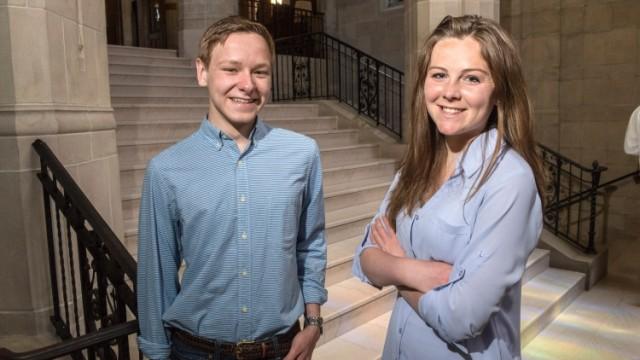After co-founding the Medical Humanities Journal of Boston College in the spring of 2015, Emilee Herringshaw and Christopher Kabacinski, both MCAS ’16, decided to take the conversation on the emerging field of medical humanities beyond the Heights: later this fall, they will co-chair the first BC and Harvard collaboration on medical humanities, a convergence of the Medical Humanities Journal of BC and Medical Humanities Forum of Harvard College.
The collaboration started shortly after the inaugural publication of the journal in April. The undergraduate journal caught the attention of the like-minded Medical Humanities Forum at Harvard, a student organization that seeks to provide an outlet for student voices in the medical humanities. According to Herringshaw, Harvard currently lacks an organizational structure for the medical humanities beyond the offering of a medical humanities class, but is looking to expand their programming, generate student interest, and build the academic infrastructure for a medical humanities program in the foreseeable future. The collaboration provided the opportunity to enhance the conversation on the medical humanities across both collegiate communities.
“We thought it would be a great idea to facilitate the exchange of ideas between BC and Harvard, and share in this collaborative so that we could really start more of a community-based conversation surrounding the issues of medical humanities, more than what’s just vocalized on the Heights,” Herringshaw said. “This has come together very recently but we are excited to unify through these efforts.”
The field of medical humanities takes a humanistic approach to the study of medicine—it is a multidisciplinary cultural study of illness, health care, disease, and the body, among other topics. The recently created Medical Humanities, Health, and Culture minor at BC—which brings together curriculum from a broad range of departments in the Arts & Sciences, including the humanities, the social sciences, and the natural sciences—provides an academic and organizational foregrounding for the medical humanities community at BC.
Both the Medical Humanities Journal and the Medical Humanities minor will serve as affiliates for October’s event.
“It’s great that the new minor at BC is able to partner with undergraduates at Harvard who share strong interests in health and the humanities,” said Amy Boesky, director of the medical humanities, health, and culture minor, in an email. “So many of the minor’s endeavors have involved collaboration and teamwork; this new initiative extends that as it allows students from two universities to collaborate together.”
The event will feature a composite of undergraduate speakers from both BC and Harvard, providing an oral platform for students to share original works and writings. Though the formal assembly of speakers has yet to be finalized, pieces from the latest publication of the journal will be read, as well as works from outside of the journal. Herringshaw hopes for the event to present work in the medical humanities through a more dynamic lens, as the actual reading can allow for a more enhanced emotional sense of the works than just a textual context.
“Issues like health, illness, disability, and representations of the body are reinvigorated and represented in new lights by the creative work of these students,” Kabacinski said in an email. “This collaboration underscores the positive momentum of interdisciplinary study, especially in the Boston area.”
As far as attendance for the reading, Herringshaw and Kabacinski have reached out to both undergraduate communities and faculty from BC and Harvard, as well as locals in the greater Boston community involved with the medical humanities otherwise.
With nearly 500 confirmed attendees on the Facebook event already, the event speaks to a growing student interest in the emerging field of medical humanities. The recent creation of the minor and the launching of the journal further proves this undergraduate interest.
“I think there’s definitely a space for it [the medical humanities], and we’ve just been trying to figure out exactly how to get to that space,” Herringshaw said.
Both Herringshaw and Kabacinski see this collaborative as a sustainable effort and an opportunity to encourage future academic conversations surrounding the medical humanities at both institutions beyond this initial meeting.
“We’re looking to unify students and communities and institutions through the solidarity of experience, rather than categorization by condition,” Herringshaw said. “So that the human essence is engaged, represented, and shared amongst individuals with various backgrounds and experiences.”
Featured Image Courtesy of BC Chronicle













